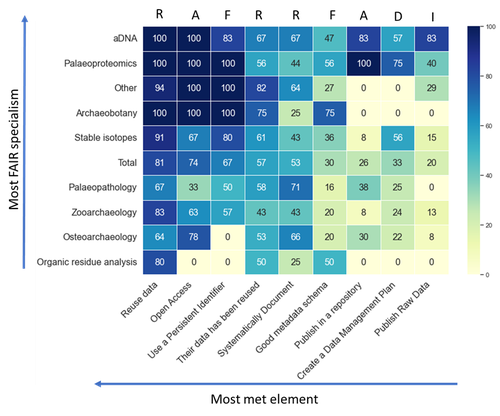
KAROUNE Emma
- Tools, practices and systems program, The Alan Turing Institute, London, United Kingdom
- Archaeobotany, Asia, Environmental archaeology, Mesolithic, Neolithic, Paleoenvironment, Taphonomy
- recommender
Recommendations: 0
Review: 1
Review: 1

How FAIR is Bioarchaeological Data: with a particular emphasis on making archaeological science data Reusable
FAIR data in bioarchaeology - where are we at?
Recommended by Claudia Speciale based on reviews by Emma Karoune, Jan Kolar and 2 anonymous reviewersThe increasing reliance on digital and big data in archaeology is pushing the scientific community more and more to reconsider their storing and use [1, 2]. Furthermore, the openness and findability in the way these data are shared represent a key matter for the growth of the discipline, especially in the case of bioarchaeology and archaeological sciences [3].
In this paper, [4] the author presents the result of a survey targeted on UK bioarchaeologists and then extended worldwide. The paper maintains the structure of a report as it was intended for the conference it was part of (CAA 2023, Amsterdam) but it represents the first public outcome of an inquiry on the bioarchaeological scientific community. A reflection on ourselves and our own practices. Are all the disciplines adhering to the same policies? Do any bioarchaeologist use the same protocols and formats? Are there any differences in between the domains? Is the Needs Analysis fulfilling the questions?
The results, obtained through an accurate screening to avoid distortions, are creating an intriguing picture on the current state of "fairness" and highlighting how Institutions' rules and policies can and should indicate the correct workflow to follow. In the end, the wide application of the FAIR principles will contribute significantly to the growth of the disciplines and to create an environment where the users are not just contributors, but primary beneficiaries of the system.
[1] Huggett j. (2020). Is Big Digital Data Different? Towards a New Archaeological Paradigm, Journal of Field Archaeology, 45:sup1, S8-S17. https://doi.org/10.1080/00934690.2020.1713281
[2] Nicholson C., Kansa S., Gupta N. and Fernandez R. (2023). Will It Ever Be FAIR?: Making Archaeological Data Findable, Accessible, Interoperable, and Reusable. Advances in Archaeological Practice 11 (1): 63-75. https://doi.org/10.1017/aap.2022.40
[3] Plomp E., Stantis C., James H.F., Cheung C., Snoeck C., Kootker L., Kharobi A., Borges C., Reynaga D.K.M., Pospieszny Ł., Fulminante, F., Stevens, R., Alaica, A. K., Becker, A., de Rochefort, X. and Salesse, K. (2022). The IsoArcH initiative: Working towards an open and collaborative isotope data culture in bioarchaeology. Data in brief, 45, p.108595. https://doi.org/10.1016/j.dib.2022.108595
[4] Lien-Talks, A. (2024). How FAIR is Bioarchaeological Data: with a particular emphasis on making archaeological science data Reusable. Zenodo, 8139910, ver. 6 peer-reviewed and recommended by Peer Community in Archaeology. https://doi.org/10.5281/zenodo.8139910